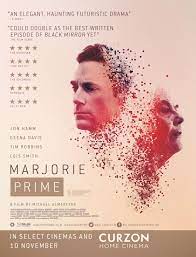
MARJORIE PRIME
US, 2017, 99 minutes, Colour.
Lois Smith, John Hamm, Geena Davis, Tim Robbins, Stephanie Andujar.
Directed by Michael Almeyreda.
Soon after the release of Marjorie Prime, there was a science-fiction, science-fantasy drama called Archive. The thrust of these films (with memories of Alex Garland’s Ex Machina) was preserving the memories of the dead. With Archive, a scientist was working with robotics, the retention of memories and incorporating them into the robot.
With Marjorie Prime, the means of preserving the memories of the dead is through holograms.
There are many conversations in this film, the preservation of memories and the opportunities to share them. In the central cast is expert at these conversations, especially actor and actress, Lois Smith, in one of her best roles, as an elderly grandmother involved in conversations with her deceased husband and with her daughter and son-in-law, but also then, in different mode, as a hologram for her daughter.
The daughter is played by Geena Davis, the son-in-law by Tim Robbins who is involved in the industry for holograms, and Jon Hamm is the deceased husband.
One has to be very attentive as to what is happening, where central characters are alive, when they die, when they become holograms. Which gives each of the cast an opportunity to vary their personalities as to when they are living persons and as to when they are holograms.
Intriguing. The was written and directed by Michael Almeyrada, responsible for a number of offbeat and small productions, including variations on Shakespeare’s Othello, Hamlet and Cymbeline.
- The title, the focus on Marjorie and her life? And the technology of holograms, the Primes?
- Based on a play? Theatrical treatment? Dialogue, long conversations? Confined spaces and situations? The effect? Intellectual attention? Audiences finding the conversations dull/boring?
- The audience taken off guard, Marjorie at 86, the presence of Water, the conversations, his age when proposing to Marjorie? The sharing of memories? Discussions? Testing what should be remembered? The revelation that he was a hologram?
- Futuristic science-fiction, science-fantasy? The work on producing holograms? The storage of memories? The description of memories – remembering the last memory, memory of memories, not the original memory?
- The plausibility of such hologram development? Its use?
- Marjorie and her story, violin player, meeting Walter, marrying, Tess, the memory of the children, of dogs and pets, funerals? Outliving her husband by years? The need for her to have a hologram? Her living with Tess, with John, her past disapproval of John? His working for the company and holograms? Her ordinary life, conversations at home, discussions about the hologram? Building up to her death?
- Tess and John, the relationship, Tess and the tormented memories of her relationship with her mother? Having the hologram of her mother, the conversations on memories, to testing of Tess?
- Julie, caring for Marjorie, getting caught up in the real and hologram controversies, being fired?
- The hologram of the very aged Walter? Tess seeing him?
- The succession of reality, holograms, more holograms? The dramatic impact, the searching for memories, altered memories?